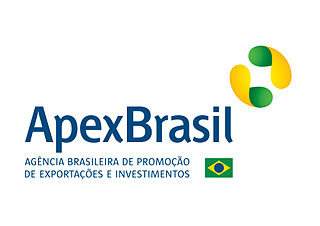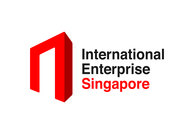
The economy of Singapore is a highly developed mixed market economy with dirigiste characteristics. Singapore's economy has been consistently ranked as the most open in the world, the joint 4th-least corrupt, and the most pro-business. Singapore has low tax-rates and the second highest per-capita GDP in the world in terms of purchasing power parity (PPP). The Asia-Pacific Economic Cooperation (APEC) is headquartered in Singapore.
An export in international trade is a good produced in one country that is sold into another country or a service provided in one country for a national or resident of another country. The seller of such goods or the service provider is an exporter; the foreign buyers is an importer. Services that figure in international trade include financial, accounting and other professional services, tourism, education as well as intellectual property rights.
Japan External Trade Organization is an Independent Administrative Institution established by Japan Export Trade Research Organization as a nonprofit corporation in Osaka in February 1952, reorganized under the Ministry of International Trade and Industry (MITI) in 1958, and became an Independent Administrative Institution in 2003 to consolidate Japan's efforts in export promotion. The government has provided more than half of JETRO's annual operating budget. As of January 2020, JETRO maintained seventy-four offices in fifty-four countries, as well as forty-eight regional offices in Japan, with a total staff of 1,730. Its main office is located in the Ark Mori Building in Akasaka, Tokyo. Initially, JETRO's activities focused mainly on promoting exports to other countries. As exporters established themselves in world markets and the balance of trade turned from deficit to surplus, however, JETRO's role shifted to encompass more varied activities. These have included the furtherance of mutual understanding with trading partners, strategic investment attraction, import promotion, liaison between small businesses in Japan and their overseas counterparts, and data dissemination. Import promotion services have included publications, promotion of trade fairs, seminars, and trade missions.

The Economic Development Board (EDB) is a statutory board under the Ministry of Trade and Industry of the Government of Singapore that plans and executes strategies to sustain Singapore as a leading global hub for business and investment.
The Australian Trade and Investment Commission, or Austrade, is the Australian Government's trade, investment and education promotion agency which was also given responsibility for tourism policy, programs and research from 2013. Austrade was established under the Australian Trade Commission Act 1985. It is a non-corporate Commonwealth entity under the Public Governance, Performance and Accountability Act 2013, and a statutory agency under the Public Service Act 1999. Austrade is part of the Foreign Affairs and Trade portfolio.
International business refers to the trade of Goods and service goods, services, technology, capital and/or knowledge across national borders and at a global or transnational scale.
Developmental state, or hard state, is a term used by international political economy scholars to refer to the phenomenon of state-led macroeconomic planning in East Asia in the late 20th century. In this model of capitalism, the state has more independent, or autonomous, political power, as well as more control over the economy. A developmental state is characterized by having strong state intervention, as well as extensive regulation and planning. The term has subsequently been used to describe countries outside East Asia that satisfy the criteria of a developmental state. The developmental state is sometimes contrasted with a predatory state or weak state.
The Taiwan Miracle or Taiwan Economic Miracle refers to Taiwan's rapid economic development to a developed, high-income country during the latter half of the twentieth century.

The Ministry of Economy, Trade and Industry, METI for short, is a ministry of the Government of Japan. It was created by the 2001 Central Government Reform when the Ministry of International Trade and Industry (MITI) merged with agencies from other ministries related to economic activities, such as the Economic Planning Agency.

SARIO, Slovak Investment and Trade Development Agency is a government agency established in the Slovak Republic in 2001, which works under the direction of the Ministry of Economy of the Slovak Republic.
Trade is a key factor of the economy of China. In the three decades following the dump of the Communist Chinese state in 1949, China's trade institutions at first developed into a partially modern but somewhat inefficient system. The drive to modernize the economy that began in 1978 required a sharp acceleration in commodity flows and greatly improved efficiency in economic transactions. In the ensuing years economic reforms were adopted by the government to develop a socialist market economy. This type of economy combined central planning with market mechanisms. The changes resulted in the decentralization and expansion of domestic and foreign trade institutions, as well as a greatly enlarged role for free market in the distribution of goods, and a prominent role for foreign trade and investment in economic development.

The Standards, Productivity and Innovation Board was a statutory board under the Ministry of Trade and Industry of the Singapore Government. It worked as an agency for enterprise development, and helped enterprises enhance their competitiveness in the Singapore market. It was also the national standards and conformance body.
Commercial diplomacy is diplomacy that focuses on development of business between two countries. It aims at generating commercial gains in the form of trade and inward and outward investment by means of business and entrepreneurship promotion and facilitation activities in the host country. Commercial diplomacy is pursued with the goal of gaining economic stability, welfare, or competitive advantage.
The National Export Initiative (NEI) is a strategy created by the Obama administration to double U.S. exports between 2010 and the end of 2014 and support 2 million domestic jobs through increased intergovernmental cooperation in export promotion. The initiative was created by Executive Order 13534 after President Barack Obama called for the doubling of U.S. exports in his 2010 State of the Union address.
Trade promotion is an umbrella term for economic policies, development interventions and private initiatives aimed at improving the trade performance of an economic area. Such an economic area can include just one country, a region within a country, or a group of countries involved in an economic trade area. Specific industries may be targeted. Improvement is mainly sought by increasing exports both in absolute terms and relative to imports. When specific industries are targeted, trade promotion policies tend to target industries that have a comparative advantage over their foreign competitors. Trade promotion can also include expanding the supply of key inputs in a country's strongest industries, via import expansion. If successful, such a tactic would lead to pro-trade biased growth.
Enterprise Florida, Inc.(EFI) was a public–private partnership between Florida’s business and government leaders and was the principal economic development organization for the state of Florida. EFI’s mission was to expand and diversify the state’s economy through job creation. In pursuit of its mission, EFI worked closely with a statewide network of economic development partners and was funded both by the State of Florida and by private-sector businesses. Enterprise Florida did not disclose who its donors were.
The Global Markets Action Plan (GMAP) was Prime Minister Stephen Harper's government strategy to generate employment opportunities for Canadians by expanding Canadian businesses and investment in other countries in a highly competitive global environment.
The Ministry of SMEs and Startups is a ministry of the Republic of Korea, established in July 2017 by the Moon Jae-in government. It succeeds the former Small and Medium Business Administration. The headquarters are located in Sejong City, Sejong. As of February 2021, Lee Young, a member of the National Assembly and People Power Party, has been appointed as the South Korean Minister of SMEs and Startups.

Enterprise Singapore (ESG) is a statutory board under the Ministry of Trade and Industry of the Government of Singapore. It was formed on 1 April 2018 to support Singapore small and medium enterprise (SMEs) development, upgrade capabilities, innovate, transform, and internationalise. It also supports the growth of Singapore as a trading and startup hub, and continues to be the national standards and accreditation body.

The Brazilian Trade and Investment Promotion Agency, or ApexBrasil is both the trade promotion organisation (TPO) and the investment promotion agency (IPA) of Brazil. Founded in 1997 as a subsidiary of the micro and small business support organisation SEBRAE, ApexBrasil became in 2003 an autonomous non-profit entity funded by the private sector and supervised by the Federal Government of Brazil. Formally linked to the Foreign Ministry since 2016, it promotes Brazilian products and services abroad, attracts foreign direct investment and supports national companies, especially small and medium-sized, on their international journey. Through its programmes and services, ApexBrasil supports approximately one third of Brazil's annual exports and contributes to facilitate at least one fourth of its foreign direct investment (FDI) inward flows each year. More than 15 thousand Brazilian companies are directly supported by the agency, virtually all of them micro, small or medium-sized.







